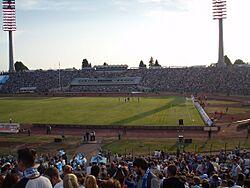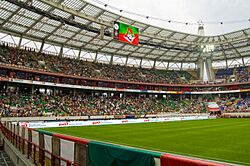Russian Premier League facts for kids
 |
|
| Organising body | Russian Football Union (RFU) |
|---|---|
| Founded | 1992 (as Top League) 2001 (as Premier League) |
| Country | Russia |
| Confederation | UEFA |
| Number of teams | 16 |
| Level on pyramid | 1 |
| Relegation to | First League |
| Domestic cup(s) | Russian Cup Russian Super Cup |
| Current champions | Krasnodar (1st title) (2024–25) |
| Most championships | Spartak Moscow Zenit Saint Petersburg (10 titles) |
| TV partners | List of broadcasters |
The Russian Premier League (RPL) is the top professional association football league in Russia. It is the highest level of football in the country. The league started in 1992 as the Russian Top League. It changed its name to the Russian Football Premier League in 2001 and then to its current name, Russian Premier League, in 2018. Since July 2022, it is also known as the Mir Russian Premier League for sponsorship reasons.
There are 16 teams that play in the Russian Premier League. Before 2022, the top teams from the league could play in big European competitions like the UEFA Champions League and UEFA Conference League. However, Russian clubs and national teams are currently not allowed to play in these international competitions.
At the end of each season, the two teams at the very bottom of the league table move down to the Russian First League. The teams in 13th and 14th place play special matches against teams from the First League. These matches decide if they stay in the Premier League or move down.
Since the Russian Premier League began in 2002, several teams have won the championship. Zenit Saint Petersburg and Spartak Moscow have won 10 titles each. CSKA Moscow has won 6 times. Other winners include Lokomotiv Moscow (3 times), Rubin Kazan (2 times), and Krasnodar (1 time). Krasnodar are the current champions, having won the 2024–25 season.
Contents
How the League Started
After the dissolution of the Soviet Union in 1991, each country that was part of the Soviet Union started its own football league. In Russia, six teams that played in the top Soviet league joined 14 other teams. This created a new 20-team Russian Top Division in 1992.
To make sure there weren't too many games, the Top Division was split into two groups. The number of teams was then reduced to 18 in 1993 and 16 in 1994. Since then, the Russian Top Division and later the Premier League have mostly had 16 teams.
In the early years, Spartak Moscow was very strong, winning nine out of the first ten titles. The only team to break their winning streak was Spartak-Alania Vladikavkaz, which won in 1995. Later, other teams like Lokomotiv Moscow and CSKA Moscow also started winning titles. In 2007, Zenit St. Petersburg won their first Russian title. In 2008, Rubin Kazan, a new team to the top league, also won the championship.
In 2018, the league changed its logo and overall look.
How the Competition Works
In the Russian Premier League, each team plays every other team twice. They play once at their home stadium and once away. This means each team plays a total of 30 matches in a season.
- A team gets three points for winning a match.
- They get one point for a draw (a tie).
- They get zero points for losing.
If two or more teams have the same number of points at the end of the season, there are rules to decide who ranks higher. These rules look at things like how many games they won or the difference between goals scored and goals allowed. If teams are tied for first place, they might even play an extra championship match to decide the winner.
The two teams at the bottom of the league table are moved down to the Russian First League. The teams in 13th and 14th place play two special matches against teams from the First League. The winners of these matches get to play in the Premier League next season.
Unlike many other European football leagues, the Russian Premier League used to play from March to November. This was to avoid playing in the cold winter weather. However, since the 2012–13 season, the league now plays from autumn to spring, similar to other European leagues. This means there is a long winter break from mid-December to mid-March.
Youth Championship
The Youth Championship is a special league that runs alongside the main Russian Premier League. It is for the youth or reserve teams of the Premier League clubs. This league helps young players get experience.
There are rules about how many older players (over 21) or non-Russian players a team can have on the field. Sixteen teams play in this league. The matches are often played a day before the main senior teams play. All Russian Premier League clubs must have a youth team in this championship. If a team gets promoted from a lower league and doesn't have a youth team, they have to create one.
Teams in the Youth Championship don't get moved up or down based on their own results. Instead, their position depends on how their senior team performs in the main Premier League.
Some Premier League clubs even have three teams: the main senior team, the youth team, and another senior team that plays in a lower division. This third team acts like a "farm team" to help develop players for the main squad. For example, Krasnodar-2 plays in the Russian First League.
Youth Championship Winners
- 2001: Rotor Volgograd
- 2002: Dynamo Moscow
- 2003: Dynamo Moscow
- 2004: Terek Grozny
- 2005: CSKA Moscow
- 2006: Spartak Moscow
- 2007: Spartak Moscow
- 2008: Spartak Moscow
- 2009: Zenit Saint Petersburg
- 2010: Spartak Moscow
- 2011: Lokomotiv Moscow
- 2012: Dynamo Moscow
- 2012–13: Spartak Moscow
- 2013–14: Dynamo Moscow
- 2014–15: Dynamo Moscow
- 2015–16: Lokomoscow
- 2016–17: Spartak Moscow
- 2017–18: Krasnodar
- 2018–19: CSKA Moscow
- 2019–20: Dynamo Moscow
- 2020–21: CSKA Moscow
- 2021–22: CSKA Moscow
Current Teams (2025–26 Season)
Here are the teams playing in the 2025–26 Russian Premier League season:
| Team | Home city | Stadium | Capacity | Head coach |
|---|---|---|---|---|
| Akron Tolyatti | Zhigulyovsk | Kristall Stadium | 3,065 | |
| Akhmat Grozny | Grozny | Akhmat-Arena | 30,597 | |
| Baltika Kaliningrad | Kaliningrad | Kaliningrad Stadium | 35,016 | |
| CSKA Moscow | Moscow | VEB Arena | 30,457 | |
| Dynamo Makhachkala | Makhachkala | Dynamo Stadium | 15,200 | |
| Dynamo Moscow | Moscow | VTB Arena | 26,700 | |
| Krasnodar | Krasnodar | Krasnodar Stadium | 34,291 | |
| Krylia Sovetov | Samara | Solidarnost Arena | 44,918 | |
| Lokomotiv Moscow | Moscow | RZD Arena | 27,320 | |
| FC Nizhny Novgorod | Nizhny Novgorod | Nizhny Novgorod Stadium | 44,899 | |
| Rostov | Rostov-on-Don | Rostov Arena | 45,000 | |
| Rubin Kazan | Kazan | Kazan Arena | 45,379 | |
| Sochi | Sochi | Fisht Olympic Stadium | 44,287 | |
| Spartak Moscow | Moscow | Lukoil Arena | 44,307 | |
| Torpedo Moscow | Moscow | Luzhniki Stadium | 81,000 | |
| Zenit Saint Petersburg | Saint Petersburg | Krestovsky Stadium | 67,800 |
League Champions Through the Years
This table shows the winners, runners-up, and third-place teams for each season of the Russian Top League and Russian Premier League. It also lists the top goal scorer for that season.
Club Performance in the Premier League
This table shows how many times each club has won, been second, or finished third in the Russian Premier League.
| Club | Winners | Runners-up | Third place | Seasons won | |||||
|---|---|---|---|---|---|---|---|---|---|
| Spartak Moscow |
|
|
|
1992, 1993, 1994, 1996, 1997, 1998, 1999, 2000, 2001, 2016–17 | |||||
| Zenit Saint Petersburg |
|
|
|
2007, 2010, 2011–12, 2014–15, 2018–19, 2019–20, 2020–21, 2021–22, 2022–23, 2023–24 | |||||
| CSKA Moscow |
|
|
|
2003, 2005, 2006, 2012–13, 2013–14, 2015–16 | |||||
| Lokomotiv Moscow |
|
|
|
2002, 2004, 2017–18 | |||||
| Rubin Kazan |
|
|
|
2008, 2009 | |||||
| Alania Vladikavkaz |
|
|
|
1995 | |||||
| Krasnodar |
|
|
|
2024–25 | |||||
| Rotor Volgograd |
|
|
|
||||||
| Dynamo Moscow |
|
|
|
||||||
| Rostov |
|
|
|
||||||
| Sochi |
|
|
|
||||||
| Torpedo Moscow |
|
|
|
||||||
| Krylia Sovetov Samara |
|
|
|
||||||
| Anzhi Makhachkala |
|
|
|
Total | 33 | 33 | 33 |
Most Seasons Played by Clubs (1992–2025)
A total of 52 teams have played at least one season in the top Russian football league. Spartak Moscow, CSKA Moscow, and Lokomotiv Moscow are the only teams that have played in every season since the league started in 1992. Teams in bold are playing in the 2025–26 Premier League season.
| Seasons | Clubs |
|---|---|
| 33 | Spartak Moscow, CSKA Moscow, Lokomotiv Moscow |
| 32 | Dynamo Moscow |
| 31 | Rostov |
| 30 | Zenit Saint Petersburg, Krylia Sovetov Samara |
| 21 | Rubin Kazan |
| 18 | Akhmat Grozny |
| 17 | Torpedo Moscow |
| 16 | Alania Vladikavkaz, Ural Yekaterinburg |
| 14 | Rotor Volgograd, Amkar Perm, Krasnodar |
| 12 | Saturn Ramenskoye |
| 11 | Anzhi Makhachkala |
| 10 | Shinnik Yaroslavl |
| 9 | Moscow, Tom Tomsk, Kuban Krasnodar |
| 8 | Lokomotiv Nizhny Novgorod, Chernomorets Novorossiysk, Ufa |
| 7 | Zhemchuzhina-Sochi, Arsenal Tula, Fakel Voronezh, Khimki |
| 6 | Spartak Nalchik, Orenburg |
| 5 | Tekstilshchik Kamyshin, KAMAZ Naberezhnye Chelny, Uralan Elista, Tyumen, Sochi |
| 4 | Luch Vladivostok, Baltika Kaliningrad, Nizhny Novgorod |
| 3 | Dynamo Stavropol, Volga Nizhny Novgorod, Mordovia Saransk |
| 2 | Okean Nakhodka, Asmaral Moscow, Sokol Saratov, Lada-Tolyatti, Tambov |
| 1 | Sibir Novosibirsk, Tosno, SKA-Khabarovsk, Yenisey Krasnoyarsk, Akron Tolyatti, Dynamo Makhachkala |
Player Records
These tables show some of the top players in the Russian Premier League based on how many games they played and how many goals they scored.
Most Appearances
As of August 4, 2025
| Rank | Player | Apps |
|---|---|---|
| 1 | 599 | |
| 2 | 489 | |
| 3 | 456 | |
| 4 | 453 | |
| 5 | 447 | |
| 6 | 433 | |
| 7 | 402 | |
| 8 | 397 | |
| 8 | 397 | |
| 10 | 394 |
Most Goals Scored
As of August 3, 2025
| Rank | Player | Goals | Apps | Avg/Game |
|---|---|---|---|---|
| 1 | 172 | 447 | 0.38 | |
| 2 | 143 | 274 | 0.52 | |
| 3 | 139 | 340 | 0.41 | |
| 4 | 129 | 377 | 0.34 | |
| 5 | 120 | 453 | 0.26 | |
| 6 | 109 | 339 | 0.33 | |
| 7 | 104 | 309 | 0.34 | |
| 8 | 102 | 456 | 0.22 | |
| 9 | 98 | 346 | 0.28 | |
| 10 | 98 | 433 | 0.23 |
Players with Most Championships
Where to Watch the Games
In Russia and Nearby Countries
| Channel | Summary | Ref |
|---|---|---|
| Match TV | Shows 60 live matches each season. | |
| Match Premier | Shows all 240 live matches. |
Watching Worldwide
All 240 matches are shown live around the world on YouTube if you have a subscription. There are two types of memberships for viewers outside Russia, nearby countries, and China. The first option costs $2.99 a month and includes two matches with English commentary each game day. The second option costs $4.99 a month and gives you access to all eight matches in Russian, plus the two with English commentary.
| Country/Region | Broadcaster |
|---|---|
| Southeast Europe | Sportklub |
| Belarus 5 | |
| Grupo Bandeirantes | |
| CIS | Qsport |
| i-cable | |
| Latin America | Gol TV |
More About Russian Football
- Football in Russia
- Russian Cup
- Soviet Top League
See also
 In Spanish: Liga Premier de Rusia para niños
In Spanish: Liga Premier de Rusia para niños
 | Claudette Colvin |
 | Myrlie Evers-Williams |
 | Alberta Odell Jones |



